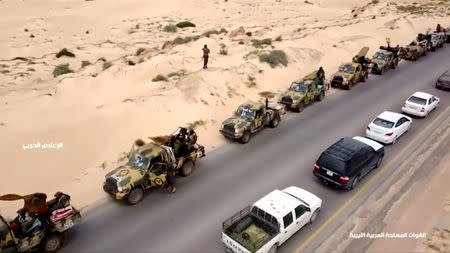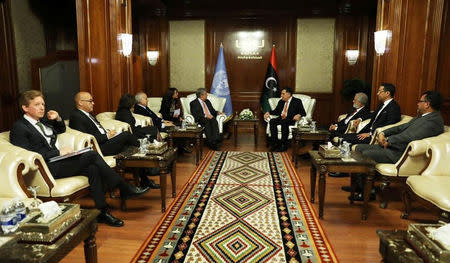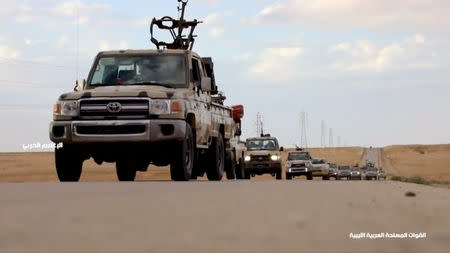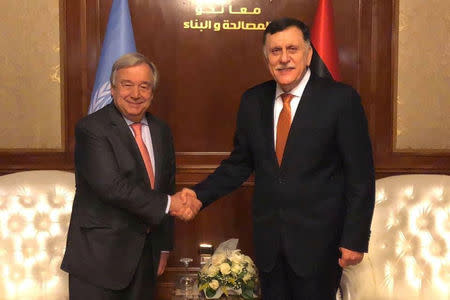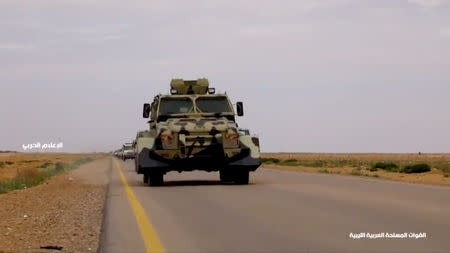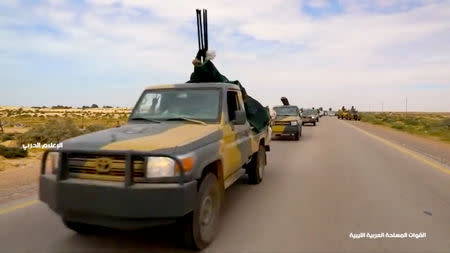Eastern Libyan commander orders forces to move on Tripoli
By Ahmed Elumami and Ayman al-Warfalli TRIPOLI/BENGHAZI (Reuters) - Eastern Libyan commander Khalifa Haftar ordered his troops on Thursday to march to the capital Tripoli, taking his conflict with the internationally recognized government to a dangerous new level. Shortly after the announcement, his forces moved on the capital from several sides, an eastern official said, making it from the south as close as al-Heira and Gharyan, two mountainous areas some 80 km (49.7 miles) south of the capital despite its force getting attacked in an air strike. The developments mark a dramatic escalation of a power tussle that has dragged on in Libya since the overthrow of Muammar Gaddafi in 2011. The offensive surprised the United Nations, whose Secretary-General Antonio Guterres flew on Wednesday to Tripoli to help organize a national conference later this month to lay the groundwork for much-delayed elections. Asked about Haftar's statement, Guterres only said Libya needed a political, not a military solution. His Libya envoy Ghassan Salame, who has been mediating for almost two years, sat next to him stone-faced with folded arms. Haftar made his order in a video posted online hours after his forces took full control of Gharyan, a town about 100 km (60 miles) south of the capital. "To our army which is stationed at the outskirts of Tripoli. Today we complete our march. ... We are going to start shortly," he said in the video titled 'Operation to liberate Tripoli.' The offensive had started with the capture of Gharyan after skirmishes on Wednesday with forces allied to Tripoli-based Prime Minister Fayez al-Serraj followed a rapid thrust westwards by Haftar's Libyan National Army (LNA) from his eastern stronghold of Benghazi. The country has been divided between the Western-backed government in Tripoli and a parallel administration allied to Haftar since Gaddafi's downfall. Armed groups from the coastal city of Misrata, which oppose Haftar, started moving toward Tripoli to defend it against the eastern advance, residents said. The governments of France, Italy, the United Arab Emirates, Britain and the United States said in a joint statement they were deeply concerned about the fighting. SETBACK The developments are a setback for the U.N. and Western countries which have been trying to mediate between Serraj and Haftar, who met in Abu Dhabi last month to discuss a power-sharing deal. The national conference the U.N. is helping to organize is aimed at forging agreement on a road map for elections to resolve the prolonged instability in Libya, an oil producer and a hub for refugees and migrants trekking across the Sahara in the hope of reaching Europe. Haftar enjoys the backing of Egypt and the United Arab Emirates, which see him as bulwark against Islamists. His opponents see in him as a new Gaddafi. The 75-year old general has in recent months increasingly taking matters in his own hands, seizing southern Libya and its oil fields. Their advance took diplomats and analysts by surprise while they were focused on neighboring Algeria, where President Abdelaziz Bouteflika resigned on Tuesday after weeks of protests. Earlier on Thursday, one of Haftar's commanders said his forces had taken full control of Gharyan. "Right now as we speak I'm driving through the town," Abdelsalam al-Hassi told Reuters by telephone. Gharyan had been allied to the Tripoli government although some Haftar supporters were also based there. The two sides fought skirmishes on Wednesday but these had ceased, town mayor Yousef al-Bdairi said. A town resident told Reuters: "The town now is under control of the army who came from the east and I can see their vehicles with their Libyan National Army logo." (Reporting by Ulf Laessing, Ahmed Elumami, Ayman al-Warfalli and Tom Miles; writing by Ulf Laessing; editing by Angus MacSwan, Andrew Heavens and Richard Chang)
